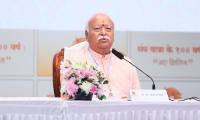The Election Commission's decision to conduct early assembly polls in Himachal Pradesh has created a piquant situation, as legally the new House cannot be constituted before the expiry of the term of the existing Vidhan Sabha on March 9 next year.
According to the election schedule announced for the hill state, polling will be held in two phases on November 14 and December 19, and counting will be held on December 28. The election process will be completed by December 31.
But the term of the current Vidhan Sabha will expire on March nine.
This will be a peculiar situation as new legislators will be elected but existing ones could continue legally for another two months to complete the five year term of the house.
Vidhan Sabha Speaker Gangu Ram Mussafir said unless and until the state cabinet takes a decision to dissolve the House or President's rule is imposed, the present Vidhan Sabha will complete its term.
As per the mandatory provision, the house session has to be called within six months of the last sitting and the rule will be followed and another session of the house will be called before expiry of its term.
The last session of the house was in August.
"This is the Constitutional position," he said, but refused to comment on the piquant situation arising out of the early announcement of polls.
Noted lawyer R L Sood said it is a 'peculiar situation' and it is probably for the first time that such a scenario has occurred in the country.
Sood said the role of the Election Commission is limited to conduct and supervision of the poll and it cannot dissolve an elected house on its own.
In that case, the newly elected legislators can take oath only after the term of the existing house completed and the new Vidhan Sabha constituted after that.
"There cannot be two sets of legislators," he said.
Some other lawyers here also echoed similar views. The Constitution says the term of the assembly will be five years unless dissolved sooner. In the normal course, the dissolution of the assembly is effected by the Governor on the advice of council of ministers.
The governor has the discretionary power but it has to be exercised only wherever specifically provided for. Satya Pal Jain, convenor of BJP's legal cell and party in-charge for Himachal Pradesh, disagreed that it was a case of 'constitutional crisis.'
"If the ruling party returns to power it will not be a problem. But, if some other party comes to power, the present chief minister will himself tender resignation and pave the way for the new one," he said.
He said this was the reason that the BJP has demanded dissolution of the Himachal Pradesh assembly after announcement of the election and conduct of the poll under President's rule.
He, however, said: "It will be a smooth transfer of power in the hill state."







